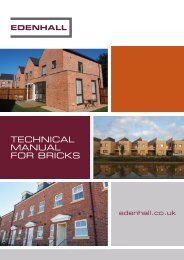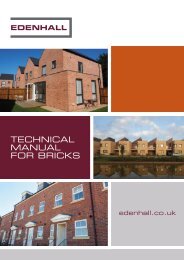You also want an ePaper? Increase the reach of your titles
YUMPU automatically turns print PDFs into web optimized ePapers that Google loves.
BTB 2<br />
Under the more recent BS EN 771-1 the old original FL grade is now categorised as F2/S2. There is no such requirement for concrete<br />
bricks and they can be classified as being equivalent to F2/S2.<br />
COMPOSITION<br />
<strong>Edenhall</strong> bricks are manufactured by compacting under a combination of high pressure and vibration a semi-dry mix of naturally<br />
occurring aggregates, portland cements, various admixtures, and synthetic iron oxide pigments. The bricks are through coloured.<br />
This gives the major advantage that any small chips or damage will be predominantly the same colour as the main face of the brick.<br />
Clay bricks are also produced using naturally dug materials, frequently blended with other materials and they are then fired in kilns.<br />
Certain bricks may only have applied faces and the body of the brick may be different from that of the applied face.<br />
WATER ABSORPTION AND WEATHERING RESISTANCE<br />
The standard for concrete bricks requires a moisture absorption by capillarity test, and results are given in the relevant Product Data<br />
Sheets. This test has superseded the more traditional 24 hour water absorption test, the results of which are also shown in the individual<br />
Product Data Sheets.<br />
The water absorption test approach is different for concrete bricks compared with that, for example, of clay bricks, but the requirements<br />
are there for different reasons. For clay bricks the test is primarily related to mortar adhesion and frost resistance, the former being<br />
important in cases of minimal or excessive suction from the mortar before it has had a chance to cure, and the latter to ensure that the<br />
correct type of brick is used in exposed conditions. A high absorption brick of low strength may be susceptible to frost attack.<br />
With concrete bricks a low-medium absorption is important to inhibit the absorption of surface dirt whilst at the same time giving<br />
sufficient suction to allow the mortar bond to develop properly. <strong>Edenhall</strong> bricks are unique in that they contain certain specialist additives<br />
which not only maintain the overall appearance but also inhibit any potential efflorescence. At the same time the continuous ageing<br />
of <strong>Edenhall</strong> bricks means the absorption reduces over time whilst the bricks still increase in strength, resulting in excellent durability<br />
characteristics.<br />
ACOUSTIC AND THERMAL PROPERTIES<br />
Concrete bricks tend to have a higher density than clay and hence have a higher sound reduction index. This can lead to better degrees<br />
of sound attenuation in flanking walls, which may be critical in those properties of lightweight construction.<br />
Conversely, concrete bricks will have a higher value of thermal conductivity than clay bricks. In real terms this will have minimal effect on<br />
the U-value of a wall construction due to the degree of secondary thermal insulation necessary to meet Building Regulations.<br />
GREEN CREDENTIALS<br />
<strong>Edenhall</strong> bricks have beneficial “green” credentials including the following:<br />
• The bricks are manufactured using low cement content, with raw materials sourced generally within 50 miles of the<br />
manufacturing works.<br />
• No additional heat is used in the production of the bricks. The natural exothermic reaction of the process is sufficient to cure<br />
the product.<br />
• Bricks from the core range of the same colour and texture can be replicated at different works. The core range allows<br />
manufacture in a number of locations thus minimising delivery distances and subsequent CO 2 emissions.<br />
• Concrete by its very composition is a CO 2 absorber.<br />
• Water consumption and usage during the whole manufacturing process is minimal.<br />
• CO 2 emissions in the whole manufacturing process are minimal. There is no pre-drying of materials or any firing process.<br />
• <strong>Edenhall</strong> bricks are recyclable with no deleterious materials present when crushed.<br />
• <strong>Edenhall</strong> does not need to import bricks to sustain demand.<br />
• The embodied CO 2 of <strong>Edenhall</strong> bricks is low and







